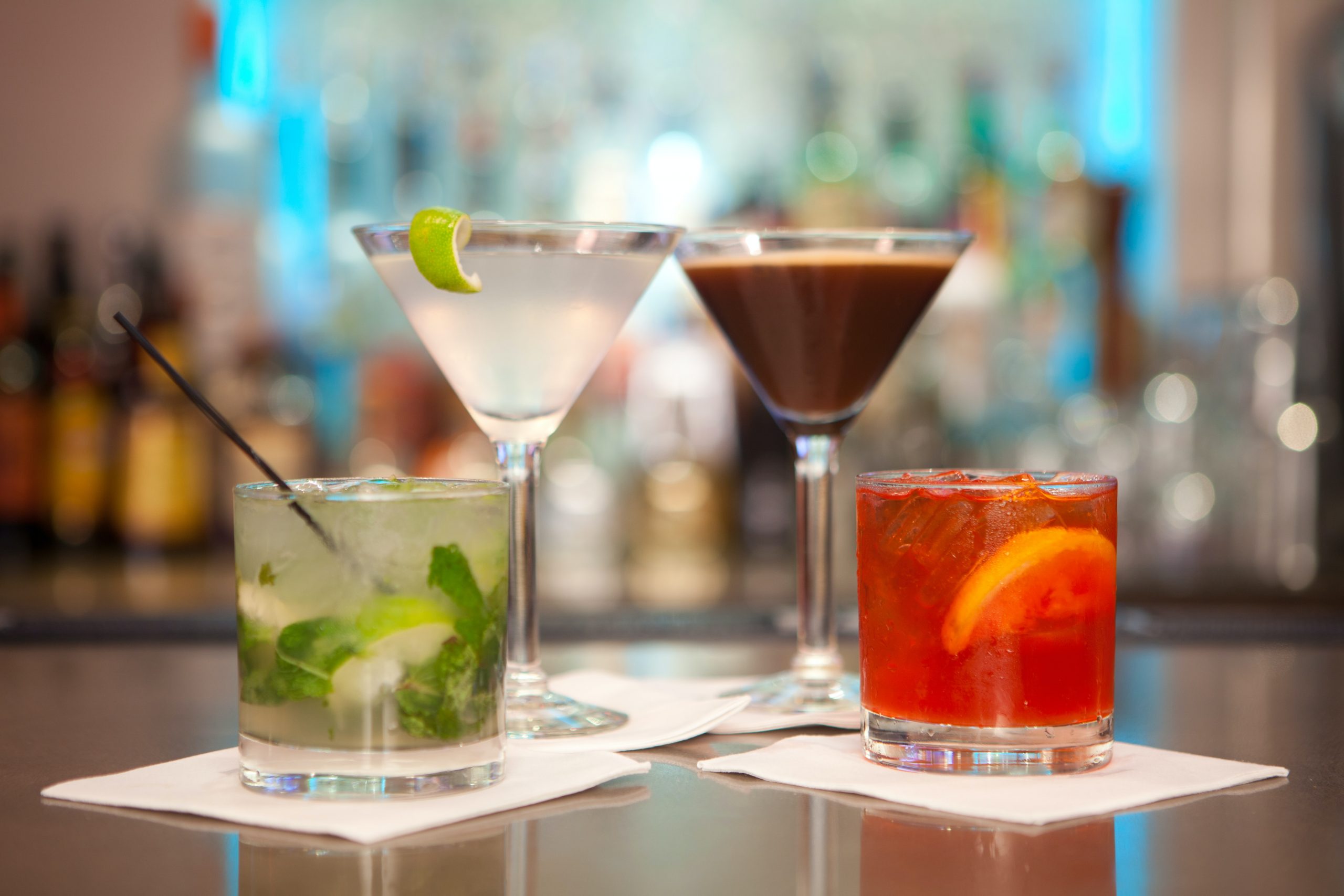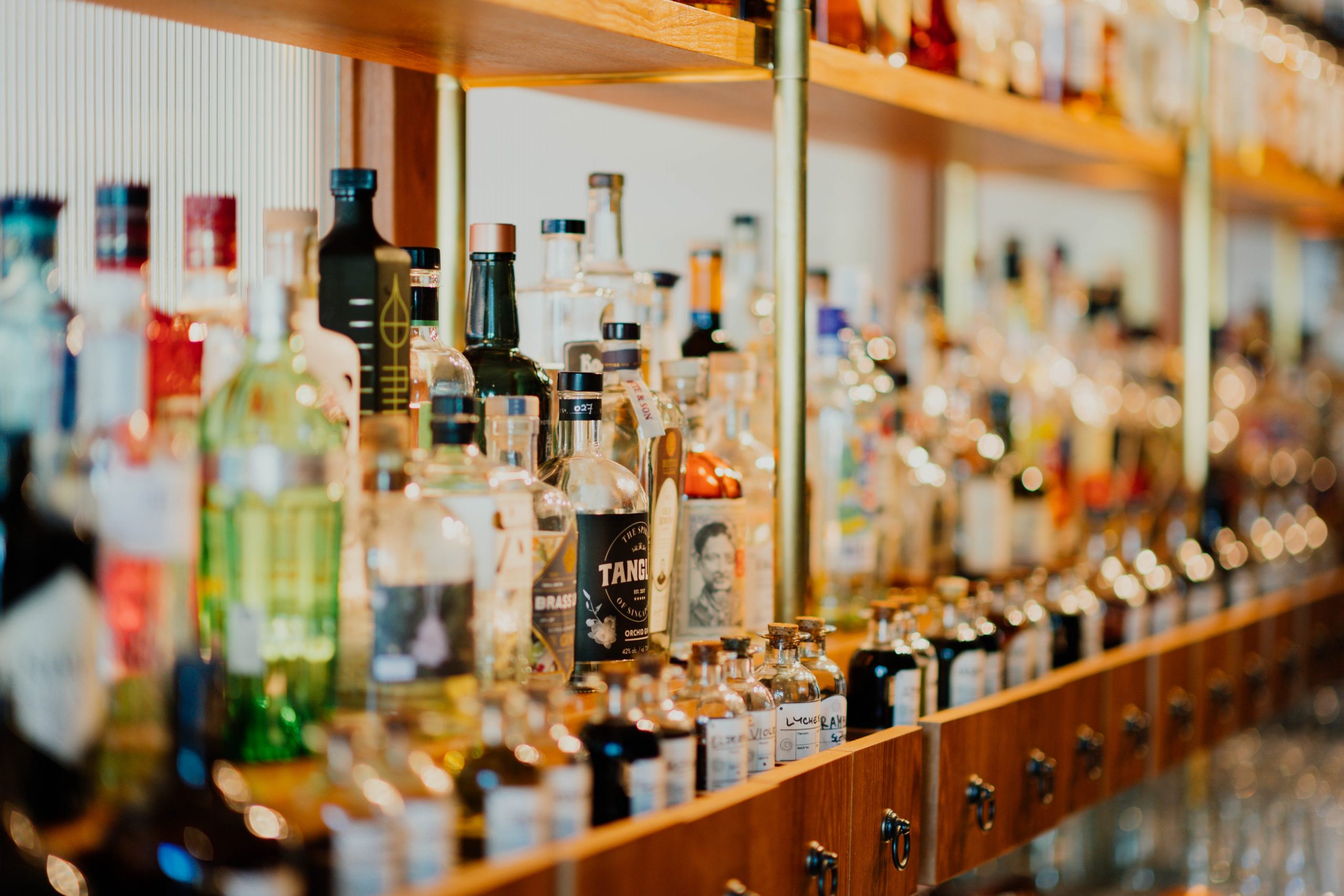There are many different kinds of alcohol available on the market. Some of them include beer, wine, and hard liquor. Others include peach brandy, vodka, and isopropyl alcohol. Despite the variety of beverages, it is important to know what percentage of these different types of alcohol will freeze.

What Percentage of Alcohol does Not Freeze?
Drinks that contain more than 35% alcohol won’t freeze in a household freezer, which is typically set at -18 C or 0 F. All spirits fall under this category. But low-proof liquids like beer and wine will freeze.
The estimated freezing points of various alcohol concentrations are listed below. Remember that the temperature in your home freezer is probably around -18 C or 0 F.
| Alcohol % | 0% | 5% | 10% | 20% | 30% | 40% | 50% |
|---|---|---|---|---|---|---|---|
| Freezing Point in C | 0C | -2C | -4C | -9C | -15C | -23C | -32C |
| Freezing Point in F | 32F | 28F | 25F | 15F | 5F | -10F | -25F |
Water (and most other liquids devoid of alcohol) freeze at 0°C and take around an hour in a typical home freezer.
At -2C, which is not too far from the lake, beer, which contains about 5% alcohol, freezes. This is because a bottle of beer’s main ingredient is water. Alcohol that does not freeze cannot be found until you reach the likes of premium vodkas and whiskies.
Does Vodka Freeze?
Simply put, a home freezer is not cold enough for vodka to freeze. The freezer can get vodka as cold as feasible because it should be served as chilled as possible. However, people frequently freeze vodka since it gets very cold when done so.
Some suggest that chilling inexpensive vodka in this method can produce a cleaner flavor and smoother texture.
You can find a detailed guide to freezing vodka here, along with our top 3 suggestions and information on how well it freezes.
Does Whiskey Freeze?
Whiskey does not freeze, so freezing whisky is not a smart idea. Drinks with a deeper, more nuanced flavor profile, like whisky, will lose that flavor when frozen.
Drinks like whisky are frequently served warmer than other spirits since doing so helps the consumer to appreciate the entire flavor profile completely.
Does Beer Freeze?
Beer does indeed freeze, but it doesn’t solidify into a block. Beer’s water content causes it to freeze before other components, giving it a slushy texture similar to that of a slush puppy.
Beer is frequently packaged in pressure-sealed glass bottles, which presents another challenge when trying to freeze it. The glass bottle may break, or the lid may pop off due to the expansion when water freezes, leaving you with a puddle of slushy beer in the freezer.
Instead, to quickly reduce the temperature of the beer, put it in the freezer for around 15 minutes.
Does Wine Freeze?
Although it will freeze, the wine will lose its texture, much like beer. Once more, this is due to the water content freezing first.
A similar problem will arise with the bottle that the wine is stored in. As the pressure inside the bottle increases due to the expansion of the water, either the cork will burst out or the bottle will break. Both scenarios are undesirable to be in!
If you wish to freeze wine for cooking, there is an exception to this rule (and only for cooking). Both white and red wine can be decanted and frozen in ice cube trays. Simply add a cube when giving a stew a wine flavor.
What Alcoholic Drinks can Freeze?
You need to look at the proof or the percentage of alcohol in alcoholic beverages to determine whether they will freeze. Anything under 30% (or 60 proof) will partially freeze. This range encompasses all brews, wines, some flavored spirits, and low-proof liqueurs.
But that doesn’t mean you’ll want to. Alcoholic beverages may lose part of their flavor and texture if frozen.
Does Freezing Alcohol Ruin it?
Yes! Most alcoholic beverages are ruined by freezing. When frozen, beer, wine, and cider will become mushy and gritty. Tequila, dark rum, and whisky will all lose their smells.
The only alcoholic beverages that freeze well are those with high proof, are clear, and frequently have a mild flavor. Vodka and gin are excellent in the freezer. They won’t freeze, but they will get quite cold, which makes drinking them much more pleasant.
White wine and beer can be quickly chilled in the freezer, but this should only be done for about 15 minutes to preserve the texture and reduce the chance that the bottles would break due to internal water expansion.
How to Thaw Wine?
Don’t panic if your wine freezes for some reason. You are still allowed to eat it and enjoy it. The secret is applying the following advice to defrost it properly.
- Let the wine defrost at room temperature on a countertop.
- To hasten the thawing process, run it under running water. Ensure that the water is not hot when it is running.
- Keep in mind not to thaw it in the microwave or the sun. If it’s hot outside, avoid defrosting it outside.
How to Avoid Frozen Wine?
Fortunately, there are techniques to guarantee that your wine won’t get frozen. Please consider the following alternatives to chilling wine in your freezer.
Employ Frozen Grapes
Wine should never be served with ice. It might dilute the wine’s flavor, making it less enjoyable to consume. A few frozen grapes can be added to wine before serving or drinking it. It’s fun to add a sweet finish while chilling your beverage.
Use a Bucket of Ice.
The natural cooling effect of salt on water. It’s customary to put a wine bottle in an ice bucket. Salt, however, can keep your wine chilled for longer. It’s a quick and affordable way to chill your drink.
Employ a Kitchen Timer.
If freezing wine is your only option, set your kitchen timer. Wine should be taken out of the freezer and served immediately when the kitchen timer goes off. Wine with 12–15% alcohol won’t freeze in the freezer for more than four hours.
Think Ahead.
You may avoid worrying about frozen wines by planning your event. Buying your wine at least a day before you intend to drink it is preferable. If you can, keep your priceless bottles in a wine chiller to maintain the ideal temperature.
Does Tia Maria Freeze?
Jamaican rum, vanilla, sugar, and coffee beans make up most of Tia Maria’s ingredients. It has powerful flavors, some of which can become bland. The best option is to serve it with ice since that is how it is often served. It will freeze because it has a 20% alcohol concentration, but it probably won’t taste the same.
How do you Freeze Alcoholic Ice Lollies?
Alcoholic ice cream is a delightful pleasure on a sweltering summer day. You need to combine four parts of non-alcoholic fluids and one component of alcohol to make them. Water, lemonade, coke, or another beverage could be used. The mixture should be poured into a lollipop mold and left to harden. Because there is a significant non-alcoholic content, they will set well.
Why don’t We Freeze Other Liquors as Much Vodka?
Not only vodka but other alcoholic beverages also have lower freezing points than most refrigerators. This explains why some people love a great cold shot of vodka straight from the freezer, says Mercree, who also points out other alcoholic beverages like whisky and rum have similar alcohol content.
But people don’t seem to freeze these other alcoholic beverages as much as they do vodka. According to Mercree, “freezing alcohol tends to decrease the flavour and aroma.” They can be frozen. However, their flavor might not be as strong. “With vodka, it really doesn’t matter, but with other, stronger alcoholic beverages, it would be less appealing.”
Why is Ethanol Difficult to Freeze?
Resuming our original inquiry, why is ethanol difficult to freeze? We are aware that alcohols are either non-polar or have very little polarity. Individual ethanol molecules have very weak intermolecular forces.
The molecules tend to avoid one another since the intermolecular forces are small. The chemical cannot exist in a solid state until the molecules unite.
The ethanol molecules do not naturally combine. The chemical needs to solidify at extremely low temperatures. Simply put, alcohol does not freeze well because the molecules have little interaction.
At What Temperature should you Keep Red Wines?
Red wine is frequently served at room temperature, which is a myth. For the numerous clients who inquire, “Should red wine be chilled?,” we at Cornet Barcelona have grown accustomed to dispelling this fallacy. When we respond “Yes,” we frequently get a bewildered expression. And certainly, regardless of whether the inquiry is, “Should Pinot Noir be chilled?,” this is always our response.
Red wine is best served chilled because serving it warm or at room temperature might depress the wine’s natural fruit flavors and make it seem sharper and more alcoholic.
Red wines should generally be served between 13 and 18 degrees Celsius.
Therefore, we advise chilling red wines for about an hour before serving. When serving, it’s also a good idea to use a wine decanter because it will let your wine aerate and catch any sediment at the bottom, making each glass as flavorful and smooth as possible.
Our well-suited stemless wine glasses are another need to enhance your wine experience even more. By choosing the right wine glass for your favorite wine variety, you can ensure that all its distinctive scents are released while avoiding the distracting burn of ethanol.
At What Temperature should you Keep White Wines?
The recommended temperature for white wine is substantially lower than that of red wines, falling between 7 to 13 degrees Celsius if you’re wondering whether it should be refrigerated.
White wines are the ones that come to mind first when customers think about chilling wines because they are the ones that are served chilled the most frequently. White wines can, however, be over-chilled, so it’s crucial to be conscious of how long your white wine has been cooled.
The wine should be served cooler, the lighter and fruitier it is. These wines include white Zinfandel, Riesling, and Pinot Grigio and are generally served at about 7 degrees Celsius, or 45 degrees Fahrenheit.
However, dry, more acidic wines like Chardonnays and Sauvignon Blancs benefit from a little warmth; the majority are served about 10 degrees Celsius, or 50 degrees Fahrenheit.
Conclusion
Alcoholic beverages with a percentage under 30% will partially freeze. On the other hand, low-alcohol beverages will freeze so quickly that they will become slush. Instead, we advise freezing solely alcoholic beverages to reduce their temperature.
